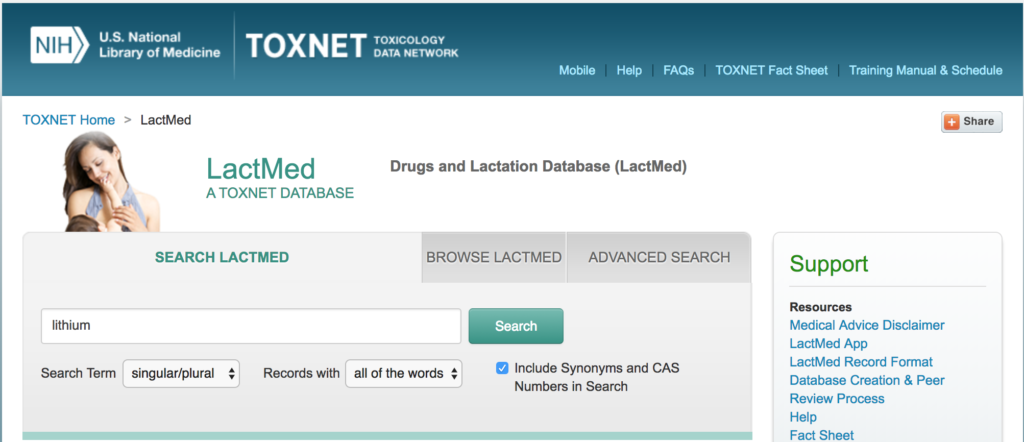It is much better to have one or two good resources rather than “tons” of places to go to. Too much is actually counterproductive.
So, where can we easily get reliable information about the risks associated with breastfeeding while on a particular medication?
LactMed® is a free online database with information on the use of medications during lactation. It is run by the National Library of Medicine. We can search the database to get a nice summary of reliable information on the use of a particular medication during lactation. The link is:
https://www.ncbi.nlm.nih.gov/sites/books/NBK501922
LactMed® includes information on:
– Medication levels in breast milk
– Medication levels in the infant
– Potential effects on the breastfeeding infant
– Potential effects on lactation
– American Academy of Pediatrics category regarding the level of compatibility of the drug with breastfeeding
– Alternative medications to consider
According to the LactMed® website, “LactMed was developed by a pharmacist who is an expert in this subject. Three other recognized authorities serve as the database’s scientific review panel.”
Here are more good things about the LactMed® website:
– A peer review panel reviews the data
– It is updated monthly
– It also provides some additional resources like links related to breastfeeding.
Related Pages
Lactation/ Breastfeeding: General articles
General approach to treating women during pregnancy and lactation
Tips on psychotropic medications during breastfeeding
Lactation and psychotropic medications: Resources
Lactation/ Breastfeeding: Specific treatments
Is sertraline safe in lactation?
Is methylphenidate safe to take during lactation (breastfeeding)?
What should we recommend about lamotrigine and breastfeeding?
Copyright © 2017 to 2025, Simple and Practical Medical Education, LLC. All rights reserved. The content on this website may not be reproduced in any form without express written permission.
Disclaimer: The material on this website is provided as general education for medical professionals. It is not intended or recommended for patients or other laypersons or as a substitute for medical advice, diagnosis, or treatment. Patients must always consult a qualified healthcare professional regarding their diagnosis and treatment. Healthcare professionals should always check this website for the most recently updated information.

Leave a Reply